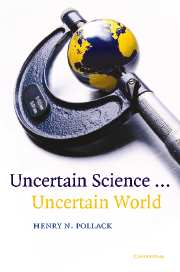Book contents
- Frontmatter
- Contents
- Acknowledgments
- About the author
- 1 Setting the stage
- 2 Uncertain about science
- 3 Can the media help?
- 4 Unfamiliarity breeds uncertainty
- 5 Fever or chill?
- 6 A fifty–fifty chance
- 7 I'm not quite sure how this works …
- 8 Let's see what happens if …
- 9 Reconstructing the past
- 10 Predicting the future
- 11 Out of the blue
- 12 In a climate of uncertainty
- Index
11 - Out of the blue
Published online by Cambridge University Press: 11 August 2009
- Frontmatter
- Contents
- Acknowledgments
- About the author
- 1 Setting the stage
- 2 Uncertain about science
- 3 Can the media help?
- 4 Unfamiliarity breeds uncertainty
- 5 Fever or chill?
- 6 A fifty–fifty chance
- 7 I'm not quite sure how this works …
- 8 Let's see what happens if …
- 9 Reconstructing the past
- 10 Predicting the future
- 11 Out of the blue
- 12 In a climate of uncertainty
- Index
Summary
Expect the best, plan for the worst, and prepare to be surprised.
Denis WheatleyAn event that cannot be anticipated, an occurrence we might call a random happening, is inevitably a source of uncertainty, if for no other reason than we do not know when it will occur. At a personal level, we may be familiar with many such events: an automobile accident, a fire or burglary at home, the sudden death of the family breadwinner, and sadly, even a surprise terrorist attack. But there are other misfortunes that can occur on a regional or even global basis, equally sudden, equally catastrophic. We are familiar with such events also, although perhaps not through direct personal experience: a flash flood, a widespread power failure, a devastating earthquake, a major volcanic eruption. Whether personal or more widespread, all are events that we fervently hope never to experience. Yet we know that on any given day there is a small, but not infinitesimal, probability that our lives may be touched by one or another of such events. Accordingly, we have developed some common strategies to deal with their consequences. The mechanisms we employ to cushion us from the consequences of these unwanted and unanticipated events include emergency preparedness and insurance, both examples of our tendency to look to the future with caution.
EMERGENCY AND DISASTER PREPAREDNESS
In the immediate and personal environment of our home, we often take steps to forestall catastrophe.
Information
- Type
- Chapter
- Information
- Uncertain Science ... Uncertain World , pp. 191 - 214Publisher: Cambridge University PressPrint publication year: 2003
